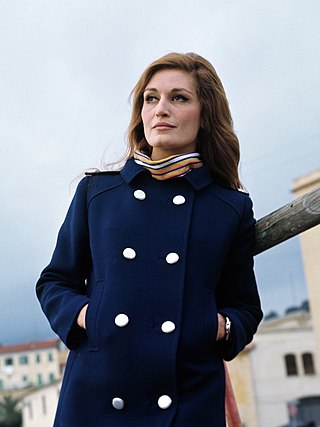
Iolanda Cristina Gigliotti, professionally known as Dalida, was an Italian naturalized French singer and actress. Leading an international career, Dalida has sold over 140 million records worldwide. Her best known songs include "Bambino", "Gondolier", "Les Enfants du Pirée", "Le Temps des fleurs", "Darla dirladada", "J'attendrai", "La Danse de Zorba", "Bang Bang", "Il venait d'avoir 18 ans", "Le Jour où la pluie viendra", "Gigi l'amoroso", "Laissez-moi danser", "Salama ya salama", "Helwa ya baladi", "Mourir sur scène" and "Paroles, paroles" featuring spoken word by Alain Delon.
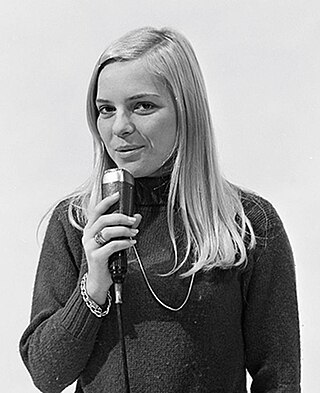
Isabelle Geneviève Marie Anne Gall, known professionally as France Gall, was a French yé-yé singer. In 1965, at the age of 17, she won the tenth edition of the Eurovision Song Contest with the song "Poupée de cire, poupée de son", representing Luxembourg. Later in her career, she became known for her work with singer-songwriter Michel Berger, whom she married in 1976. Her most successful singles include "Résiste", "Ella, elle l'a" and "Évidemment".
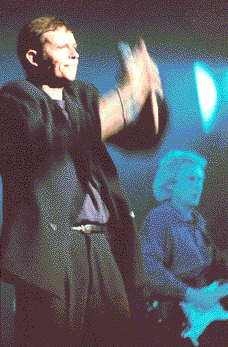
Pierre Bachelet was a French singer-songwriter and film score composer. He was also known as Andrew Bacson.
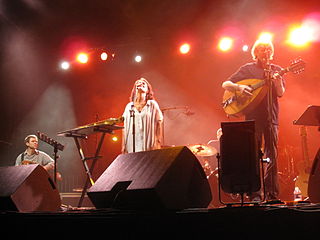
Malicorne are a French folk and folk rock band formed in September 1973 by Gabriel Yacoub, Marie Yacoub, Hughes de Courson and Laurent Vercambre. They flourished in the 1970s, broke up three times in the 1980s but re-formed twice in the early 2010s and toured from July 2012 until their last show in August 2017, after which they broke up.

Pierre Lapointe is a Canadian singer-songwriter. His work largely follows in the tradition of French chanson, though he is influenced by modern pop music. Defining himself as a "popular singer", he has built an egocentric persona of a dandy onstage, but says he does this mostly to deflect attention from himself. His records have found critical and commercial success in Canada. His regular tours in France ensured him a growing popularity as well as critical recognition.

Anaïs, full name Anaïs Croze, is a French singer. Her first album, called The Cheap Show, was recorded live in January 2004 and released in 2005. The Cheap Show, a pun on "peep-show", is titled such as she is the only musician on stage and makes extensive use of her JamMan pedal.

Paul-Alain Auguste Leclerc, known by his stage name Julien Clerc, is a French singer-songwriter.

Natalie Dessay is a French soprano, best known as an opera singer before her retirement from opera stage in 2013. She gained wide recognition after her portrayal of Olympia in The Tales of Hoffmann in 1992, and then performing at leading stages, such as the Paris Opera, Vienna State Opera, and the Metropolitan Opera.

Véronique Marie Line Sanson is a three-time Victoires de la Musique award-winning French singer-songwriter and record producer with an avid following in her native country.

Jeanne Mas is a French pop singer. She is well known in France, Switzerland, Canada and Belgium for a number of hit singles released in the 1980s. Her first success was "Toute première fois" in 1984. This song was simultaneously released in the United Kingdom in English. Two of her singles charted at number one in France: "Johnny, Johnny" and "En rouge et noir" in 1985 and 1986, respectively. Her 1980's albums are good examples of the Euro disco electropop style popular in Continental Europe at the time, featuring synthesizers and very catchy melodies.
The Grand Prix du Disque for French Song is one of a number of prizes awarded by L'Académie Charles Cros as part of the yearly Grand Prix du Disque. The following is a partial list of winners :
La Tordue was a popular musical group from Paris, France that existed from 1989 to 2003.
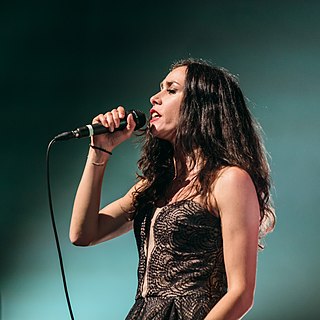
Olivia Blanc, known as Olivia Ruiz, is a French pop singer belonging to the nouvelle chanson genre. She gained fame after reaching the semi-finals of the French Star Academy series in 2001.

Claudine Luypaerts, better known as Maurane, was a Francophone Belgian singer and actress.

Catherine Lara is a French violinist, composer, singer, and author. Over a career spanning more than five decades, she has established herself as an icon in French pop/rock music as well as the neo-classical genre. She has released 26 studio albums, contributed music to numerous television and film productions, and helped stage and produce many theatrical works. Lara is openly lesbian.

Michèle Torr is a French singer and author, best known in non-Francophone countries for her participation in the Eurovision Song Contest for Luxembourg in 1966 and for Monaco in 1977.

Isabelle Marie Anne de Truchis de Varennes, better known by her stage name Zazie, is a French pop singer and songwriter. Her greatest hits include "Je suis un homme", "À ma place" and "Speed". She co-produces all her albums and is noted for her playful use of language.

Lucie Brunet, better known by the stage name Luce, is a French singer-songwriter and actress originating from Peyrestortes. She won the eighth series of the French music competition Nouvelle Star in 2010.

Jacques Dutronc is the first studio album by the French singer-songwriter Jacques Dutronc, released in 1966. Since Dutronc's first seven albums are all self-titled, the album is commonly referred to by the title of any of its three tracks which were released as singles.

Alexandre Beaupain, is a French singer and composer, both of his own songs, and of the music and songs for films, particularly those directed by Christophe Honoré. He has released several albums and received awards, both for film scores and the song albums.


















